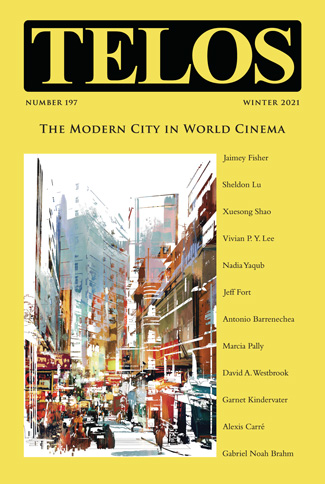By Jaimey Fisher and Sheldon Lu · Wednesday, December 15, 2021 Telos 197 (Winter 2021): The Modern City in World Cinema, edited by Jaimey Fisher and Sheldon Lu, is now available for purchase in our store. Individual subscriptions to Telos are also available in both print and online formats.
 The theme of this special issue of Telos is the modern city in world cinema. Its various essays examine the depiction of cities and their constitutive contexts through the lens of critical theory, political theory, cultural theory, and film theory. The contributors tackle a range of topics: the experience of modernity in urban contexts; cities in relation to civil society and the public sphere; the metropolis and cosmopolitanism; the urban/rural divide; cities and gendered, racial, and class divides; urban planning and urban space; film as a particular medium, with specific parameters, in the broader age of media; film as mass entertainment and as revolutionary propaganda. Even with this wide range of topics and their themes, there are many more to be explored, herein and elsewhere, so complex and rich are the relations of the urban to the cinematic. The theme of this special issue of Telos is the modern city in world cinema. Its various essays examine the depiction of cities and their constitutive contexts through the lens of critical theory, political theory, cultural theory, and film theory. The contributors tackle a range of topics: the experience of modernity in urban contexts; cities in relation to civil society and the public sphere; the metropolis and cosmopolitanism; the urban/rural divide; cities and gendered, racial, and class divides; urban planning and urban space; film as a particular medium, with specific parameters, in the broader age of media; film as mass entertainment and as revolutionary propaganda. Even with this wide range of topics and their themes, there are many more to be explored, herein and elsewhere, so complex and rich are the relations of the urban to the cinematic.
Continue reading →
By Russell A. Berman · Monday, March 28, 2016 Traveling in Paris, Judith Butler published a “letter” dated November 14, in English on the Verso blog and in French in Libération, the day after the ISIS attacks, entitled “Mourning becomes the Law.” The short text treats two phenomena and argues for a connection between them: the process of mourning the victims of the attacks and the expansion of counter-terrorist practices by the state. Butler’s thesis is that the shared grieving of the dead served exclusively as a vehicle to justify amplified police powers: in this sense, mourning becomes the law, or at least law enforcement. A close look at her claims, however, shows significant deficiencies in the account of mourning and an important misreading of the Parisian response.
Continue reading →
By Frederik Stjernfelt · Monday, November 14, 2011 Telos Press looks forward to publishing Democratic Contradictions of Multiculturalism by Jens-Martin Erikson and Frederik Stjernfelt, scheduled to appear in March 2012.
It is with an increasing feeling of sickness that I follow the incidents around the Parisian weekly Charlie Hebdo and its special issue on sharia prompted by the political developments in Libya and Tunisia.
Early in the morning of November 2nd, a window was broken and a Molotov cocktail thrown into the premises of the weekly which burned out. By sheer luck, nobody was hurt. In the expectedly strong reactions against this attack on free speech, disturbing voices and events intervene. Initially, the asylum offered to the publishers by the daily Libération constituted an encouraging event—one voice supporting the other against threats to free speech.
Continue reading →
|
|
 The theme of this special issue of Telos is the modern city in world cinema. Its various essays examine the depiction of cities and their constitutive contexts through the lens of critical theory, political theory, cultural theory, and film theory. The contributors tackle a range of topics: the experience of modernity in urban contexts; cities in relation to civil society and the public sphere; the metropolis and cosmopolitanism; the urban/rural divide; cities and gendered, racial, and class divides; urban planning and urban space; film as a particular medium, with specific parameters, in the broader age of media; film as mass entertainment and as revolutionary propaganda. Even with this wide range of topics and their themes, there are many more to be explored, herein and elsewhere, so complex and rich are the relations of the urban to the cinematic.
The theme of this special issue of Telos is the modern city in world cinema. Its various essays examine the depiction of cities and their constitutive contexts through the lens of critical theory, political theory, cultural theory, and film theory. The contributors tackle a range of topics: the experience of modernity in urban contexts; cities in relation to civil society and the public sphere; the metropolis and cosmopolitanism; the urban/rural divide; cities and gendered, racial, and class divides; urban planning and urban space; film as a particular medium, with specific parameters, in the broader age of media; film as mass entertainment and as revolutionary propaganda. Even with this wide range of topics and their themes, there are many more to be explored, herein and elsewhere, so complex and rich are the relations of the urban to the cinematic. 

